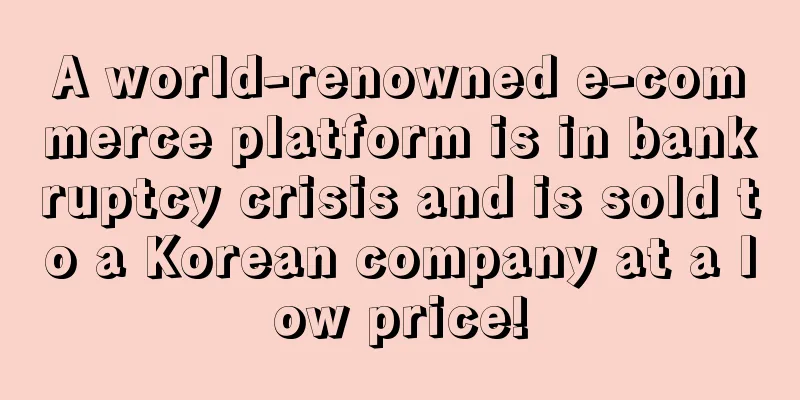A world-renowned e-commerce platform is in bankruptcy crisis and is sold to a Korean company at a low price!

|
Recently, another well-known e-commerce platform has fallen into bankruptcy crisis.
Farfetch, the world's largest luxury e-commerce company, faces bankruptcy
Recently, Farfetch, the world's largest luxury e-commerce platform, is considering privatizing the company. The company's founder José Neves is discussing delisting matters with shareholders such as Richemont Group and Alibaba Group and investment institutions such as JPMorgan Chase.
After the news was announced, Farfetch's stock price rose 22.8% to US$2.1 per share on the same day, but a week later, it closed at US$1.2 per share.
And just last week, Farfetch announced that it would cancel the release of its third-quarter financial report for fiscal year 2023.
The next day, Richemont Group issued an announcement stating that it had no financial obligations to Farfetch and had no intention of providing loans or investments to Farfetch.
In addition, Alibaba President and board member J. Michael Evans has also resigned from Farfetch's board of directors.
According to foreign media reports, Farfetch is seeking external support, and the worst outcome it may face in the future is bankruptcy.
After falling into bankruptcy crisis , Farfetch's stock price has recently fallen to 60 cents, reaching a historical low. It has plummeted 98% from its peak and its market value has evaporated by 22.75 billion US dollars.
As the world's largest luxury e-commerce platform, why is Farfetch on the verge of bankruptcy?
Farfetch was founded in 2007 and officially launched in 2008. The company sells products from more than 1,400 boutiques and brands around the world to global fashion consumers, focusing on luxury e-commerce business. At the same time, it also provides e-commerce and new retail solutions including website construction, e-commerce agency operation, offline store digitization, etc. for luxury brands and buyer stores.
In the early years, Farfetch's development momentum was quite rapid. At its peak, Farfetch's market value reached 26 billion US dollars and its annual sales exceeded 3 billion US dollars.
Farfetch is backed by a number of global investment groups, including France's Kering Group, Condé Nast Group, Russia's DST Global, and luxury giants Richemont Group and IDG Capital.
From 2010 to 2016, Farfetch went through rounds of financing from A to F.
In October 2014, Farfetch officially entered the Chinese market with its Chinese name “FaFaQi” .
According to Farfetch's official data, Farfetch's transaction volume in 2015 exceeded US$500 million, a 70% increase over the previous year. The transaction volume in the Asia-Pacific region was particularly outstanding, accounting for 26% of Farfetch's global transaction volume, of which the transaction volume in the Chinese market accounted for 12%.
After entering the Chinese market, Farfetch also received investments from several Chinese industry giants.
In June 2017, JD.com invested US$397 million in Farfetch to hold a 16.5% stake .
In January 2020, Tencent invested in Farfetch by purchasing convertible corporate bonds for US$125 million .
In November of the same year, Alibaba and Richemont jointly invested $600 million in Farfetch. In addition, after Farfetch restructured its Greater China business, Alibaba and Richemont invested another $500 million.
After receiving financial support, Farfetch has been accelerating its expansion and fully committed to the development of omni-channel luxury retail business.
According to Farfetch's financial report, Farfetch's revenue in 2020, 2021 and 2022 was US$1.674 billion, US$2.257 billion and US$2.317 billion, respectively.
It should be noted that Farfetch's performance began to decline since 2022.
Although Farfetch's revenue grew 3% to US$2.317 billion in 2022, its GMV fell 4% to US$4.1 billion. Farfetch's core luxury goods sales business is facing the challenge of continued decline in global consumer demand.
In the first half of 2023, Farfetch's revenue was US$1.128 billion , an increase of 3.14% over the same period last year, but its net loss reached US$456 million .
In the post-epidemic era, as consumers return to offline stores, it will be difficult for Farfetch to make a profit and acquire products because top luxury brands such as Hermès and Chanel refuse to sell through third parties, preferring instead to maintain control and avoid online retailers using discounts to attract consumers.
As of June 30 this year, Farfetch held cash and cash equivalents of US$454 million, a decrease of US$287.2 million in half a year.
Moreover, Farfetch is burdened with $1 billion in long-term loans and convertible bonds. Between 2027 and 2030, Farfetch will also need to repay $1.6 billion in debt. Currently, investors are worried that Farfetch does not have enough funds to pay its costs. And in December, credit rating agency Moody's downgraded Farfetch's rating to Caa2 due to concerns about its financial situation.
Farfetch, which is in deep financial crisis, has laid off about 800 employees this year alone in order to save the company's operating costs.
Flavio Cereda, a luxury goods expert and fund manager at GAM, said that Farfetch's fate is foreseeable. Since its establishment, its business model has made no sense in the luxury goods sector. After the outbreak, luxury consumption has shifted online, giving Farfetch growth opportunities. Otherwise, Farfetch might have fallen into market difficulties ahead of schedule.
Farfetch to be acquired by South Korean e-commerce platform Coupang for $500 million
However, fortunately, Farfetch, which was in prison, has finally turned the corner.
Recently, the Korean e-commerce platform Coupang issued an announcement, announcing that it will acquire the business and assets of Farfetch. Coupang will invest US$500 million to prevent Farfetch from going bankrupt.
After the transaction is completed, Farfetch will receive US$500 million in funds to continue serving brands and consumers, and Coupang will also be able to take this opportunity to enter the luxury industry.
Regarding this acquisition, José Neves, founder and CEO of Farfetch, said that Coupang has extensive experience in business operations and can provide better services to brands and boutique partners as well as millions of customers around the world.
Coupang CEO Kim Beom-seok said the company has rich experience and resources in operations and logistics, and coupled with Farfetch's leading position in the luxury ecosystem, it will be able to provide global consumers with a more outstanding shopping experience in the future.
Coupang was founded in 2010 and is headquartered in Seoul, South Korea. It is the largest e-commerce platform in South Korea. It is known as the Amazon of South Korea and currently has more than 20 million users.
The product categories on the Coupon platform are very rich, including electronics, beauty products, consumer goods, books, baby products, household items, decoration, fashion, toys, sporting goods, tickets, travel and cultural event planning, etc.
And in March 2021, Coupang was successfully listed on the New York Stock Exchange, becoming the first B2C e-commerce platform from South Korea to be successfully listed in the United States. According to analysts' research data, Coupang's sales are expected to exceed US$36 billion in 2024.
It is understood that this is the first time Coupang has acquired a multinational company since its establishment. After the acquisition is completed, Farfetch will be delisted from the New York Stock Exchange .
In reality, this acquisition is beneficial to both parties.
By acquiring Farfetch, Coupang will be able to increase its global visibility in the future while strengthening its fashion and luxury categories. Farfetch will also be able to turn the corner and avoid bankruptcy.
However, the industry's response to the deal was mediocre. After the news was announced, Coupang Inc's stock price fell 5.11% to close at US$16.15 per share .
Do you think Coupang’s acquisition is a good idea? Sellers are welcome to leave a message and participate in the discussion. Bankruptcy Acquisition |
Recommend
Amazon is selling clothing that insults Chinese people again
If there is one news topic that has been trending...
Vietnam's rural population exceeds 63%, and online shopping demand is strong
Today, e-commerce is no longer an exclusive benef...
Bulgarian Undone Store platform cooperates with Korean brand Boutijour
Bulgarian e-commerce platform Undone Store was fo...
What is culinaryteas? culinaryteas Review, Features
Culinaryteas is a small family business specialisi...
What is Tapcash? Tapcash Review, Features
Tapcash is a subsidiary of IGG, one of the famous ...
What is Riyu Logistics? Riyu Logistics Review, Features
Founded in 1999, Riyu Logistics is an AAAA-level ...
What is Starflight International Logistics? Starflight International Logistics Review, Features
Shenzhen Xingfeihang International Logistics Co.,...
What is TikTok? TikTok Review, Features
TikTok is a short video social platform developed...
Online spending reaches $861.1 billion! The top ten US e-commerce companies are here
Digital Commerce 360 updated its estimates for ...
Online sales in UAE and Saudi Arabia to reach $2 billion as Ramadan promotions arrive
A market survey by RedSeer Consulting shows that ...
What is HaiRou Innovation? HaiRou Innovation Review, Features
Hai Robotics is committed to providing efficient,...
Millennials are on the rise! Price is the most important factor affecting Filipino consumers’ purchases
Filipino millennials are the most likely to brows...
What is Naver? Naver Review, Features
Naver is one of the largest Internet portals in S...
Amazon seller was badly cheated and lost 400,000 overnight!
No matter what industry you are in, it seems diff...
What is Jinhou International Consulting? Jinhou International Consulting Review, Features
Founded in 2020, Jinhou International focuses on ...









